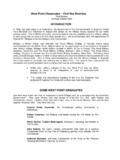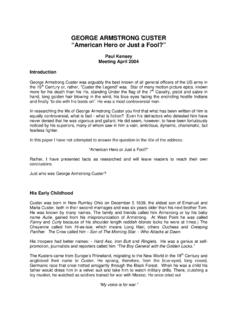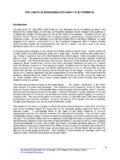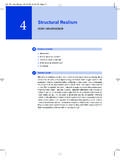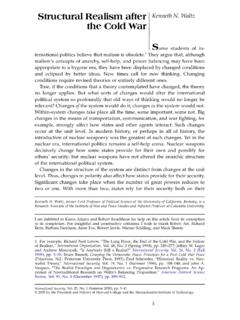Transcription of MILITARY INTELLIGENCE DURING AMERICA’S CIVIL …
1 AMERICAN CIVILWAR ROUND TABLE OF AUSTRALIA (NEW SOUTH WALES CHAPTER) MILITARY INTELLIGENCE DURING america S CIVIL WAR AUGUST 2011 2 It is hard to imagine a country less prepared for war than the United States was in late 1860 early 1861. 1. The strength of the army was only around 16,000 2. Most of these were posted in the western parts of the country remote from the Eastern Theatre where the War would eventually erupt. 3. With the exception of two senior officers, Winfield Scott and John E Wool, no officers had commanded forces the size of which would classify them as an army in the 1860 s context.
2 4. Indeed, the command experience of the younger officers was restricted to company and field grade appointments on the western plains and on the Pacific coast. Furthermore, although a majority of West Point graduates were to remain with the Union, various other MILITARY schools, including VMI in Lexington and the Citadel in South Carolina, provided a wealth of graduates for the Confederacy at company and field grade levels, a situation that was to significantly influence the early successes of Confederate forces.
3 Importantly, there was no organisation or even a set of formalised procedures that today we would refer to as MILITARY INTELLIGENCE that would assist commanders in their planning and decision making by providing information about the enemy and the battlefield environment. Furthermore, the availability of accurate maps, particularly for Union forces invading the Southern States, was to be a major problem throughout much of the War. Contributing to this lack of appropriate cartographic resources was the long-standing MILITARY tradition that maps were deemed Secret and their availability treated accordingly.
4 In this paper, the evolution of MILITARY INTELLIGENCE practices throughout the CIVIL War are outlined, first, by providing a context for the INTELLIGENCE activities and then with some examples of the successes and failures It is not intended that this paper be an exhaustive treatment of the subject, but illustrative of the way that INTELLIGENCE initiatives evolved DURING the CIVIL War period. MILITARY INTELLIGENCE can be thought of as: .. the art of knowing one s enemies INTELLIGENCE is as old as warfare itself and, although its methods have expanded with the invention of telegraph communications in the 19th Century and their supersession by radio with the advent of the electronic age in the 20th Century, INTELLIGENCE continues to be an important factor for success in warfare.
5 An early example of its use is seen in the Persian defeat of the 300 Spartans at Thermopylae in 480 King Leonidus and the 300 Spartans comprising his personal bodyguard had held the pass at Thermopylae successfully against the 100,000+ army of Xerxes for three days but were betrayed and defeated when the Persians were given information of a goat track that provided an alternative route around the pass and the Spartans defensive position. Xerxes sent his Immortals by this alternative route overcoming the Greeks guarding it and they were then able to use their superior numbers both forward and at the rear of the Spartan position to kill all 300 defenders of the pass and move onto Athens.
6 Julius Caesar s success in his campaigns against Gaul (58 50 ), were as much a result of his effective use of both strategic and tactical INTELLIGENCE as of his legions superior fighting skills. Caesar took great trouble to assemble economic and regional INTELLIGENCE and: 3 .. was a coldly cynical assessor of the Gauls ethnic defects, their boastfulness, volatility, unreliability, lack of resilience; he was equally cold in exploiting his knowledge of their weaknesses he also had a highly developed system of tactical INTELLIGENCE , using short and medium range units of scouts to reconnoitre up to 30 kilometres in advance of his main body, to spy out the land and the enemy s 1 Whilst Caesar did not invent the Roman system of INTELLIGENCE , he did much to institutionalise some of its most important features.
7 Notably the right of direct and personal access of the scouts to the force commander. DURING the five centuries2 of the Roman Empire s greatness there was little change to the INTELLIGENCE processes and the timely provision of INTELLIGENCE to army commanders remained a significant problem. Reconnaissance was by hearing and sight, communication was by written despatch or word of mouth and the maximum speed of transmission was governed by the speed that a horse could travel. These characteristics of INTELLIGENCE in Roman times were to remain true for the next 1,500 years!
8 Up until the 19th Century MILITARY INTELLIGENCE was only practised in times of war, its methods of collection, analysis and interpretation were quite primitive and commanders tended to be sceptical about the reliability of information received from various sources (spies, scouts, own troops). Importantly, for this presentation, the United States did not acquire a permanent peacetime INTELLIGENCE organisation until 1885 some 20 years after the end of the CIVIL War and the oldest of today s MILITARY INTELLIGENCE units can trace its lineage back only as far as the eve of World War II.
9 The US Army did not formally recognise INTELLIGENCE as a distinct professional discipline until 1962 and today s MILITARY INTELLIGENCE Corps incorporating all MILITARY INTELLIGENCE personnel and units into a single, large regimental structure did not come into existence until 1987. In researching the subject, I soon realised that whilst more than 50,000 books have been published about the CIVIL War, there is a dearth of scholarly historical research in the area of MILITARY INTELLIGENCE of this period.
10 There is a sad array of potboilers described by one historian as: .. books descended from the memoirs of men and women who claimed, not all of them truthfully, to have been spies for the Union or Confederacy 3 and - .. later writers have added liberally to the numerous fictions and occasional facts in these books 4 The resulting products focus, primarily on the spies trials and tribulations and where their stories refer to the outcome of battles, they exaggerate the contribution of the spy with little or no insight into the force commander s decisions and It was in October 1959, nearly a century after the CIVIL War that a remarkable discovery was made at the National Archives in Washington.
